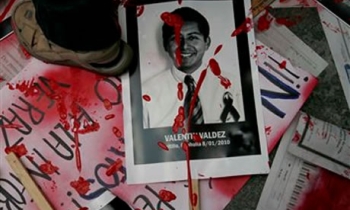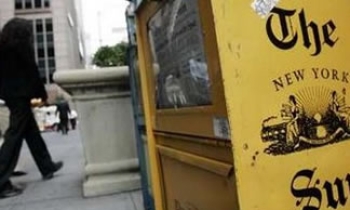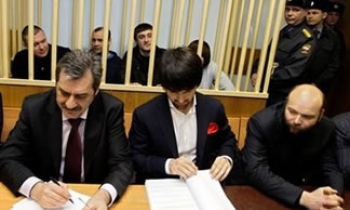Ft. LAUDERDALE-- On Monday, right at 3:00 p.m., EST, winners of the 90th annual Pulitzer Prizes in Journalism, Letters, Drama and Music will be announced at Columbia University. Given that this award is American journalism's most coveted prize, it will be a day etched into the minds of the winners forever.
So when asked where they were when word first reached their ears that they had won a Pulitzer, some former recipients were gracious enough to share their thoughts.
***
--Maureen Dowd , New York Times' columnist (1999 Pulitzer winner for distinguished commentary, chronicling President Clinton's affair with Monica Lewinsky):
"Howell Raines, then editorial page editor, came to my office in New York and told me; I was shocked and thought he must be mistaken, even after I got the telegram.''
***
-- David Maraniss, Washington Post (1993 Pulitzer winner in National Reporting for his articles on the life and political career of presidential candidate Bill Clinton).
"I was at home in Austin , Texas. I was then the Southwest bureau chief for The Washington Post. I had been out that afternoon and came home to find a message on my answering machine from my publisher, Donald Graham. I called him back, and he asked how I was, and I babbled on for two or three minutes and then he said, Oh, by the way, I'm calling to tell you won the Pulitzer Prize. I was stunned, floating...."
***
-- Jim Dwyer , New York Times (Recipient of the 1995 Pulitzer for Commentary while at Newsday for his stirring columns about New York City).
"I was at home -- my boss, Don Forst called on the Friday before the announcement. He said, 'You got it.' I said, Wow. I thanked him, hung up, and then called him back and said, 'Are you sure about this' I then swore my wife to secrecy, and she said, sure, not one person beyond the 15 she had to tell right away.
***
--Eileen McNamara, Boston Globe columnist (1997 Pulitzer winner for Commentary, chronicling the foibles and intricacies of the people of Massachusetts .)
"I was at the stove, stirring a pot of spaghetti, talking to my husband and three hungry children. The phone rang. The editor of the Globe told me I won. I began to cry. My daughter, Katie, who was 6, asked her dad why mom was crying. 'I think she just won the Pulitzer Prize,' he said. 'What's the Pully Surprise,' she asked. 'Is she going to finish the spaghetti?'
"I did--finish making the spaghetti, that is.''
***
-- Bill Keller, New York Times' executive editor (1989 International Reporting recipient for his detailed coverage of the historic events in the U.S.S.R.):
"I was in Cuba , covering Mikhail Gorbachev's summit with Fidel Castro. I called the foreign desk to check in after our plane reached Havana, and learned that editors had been quaffing champagne in my honor. This was before the Internet era of no surprises, so I'd been completely oblivious to the fact that it was the day the Pulitzers were announced.
"I went out to dinner that night with another reporter and didn't tell him my news. I think he's always taken my silence for supreme modesty, but, honestly, I was just too flustered to know how to bring it up.''
***
- Linda Greenhouse, New York Times U.S. Supreme Court reporter (1998 Beat Reporting recipient for her illuminating coverage of the Court):
"I was in the Supreme Court press room, about to sneak out early to go home and preside over a Passover seder, when my bureau chief, Mike Oreskes, called to tell me that the Times had learned that I had won the Pulitzer for beat reporting, but that I couldn't tell anyone until the public announcement early in the next week. I told my husband, but had to keep mum throughout the seder and the ensuing days.''
***
--Roy Gutman, Newsday foreign editor (1993 winner, International Reporting, for uncovering the atrocities and other human rights violations in Croatia and Bosnia-Herzegovina:
"I was in the newsroom at Newsday's head office on Long Island. I had returned to the U.S. for an annual home leave (I was European correspondent at the time) and was visiting Washington, where I had been based; my editor suggested I might want to be in the office that morning. I recall a phone call coming from Western Union with the telegram that the Pulitzer Committee had selected me for the international reporting prize. It was around 11 a.m.
"Staff had gathered in the city room -- they all seemed to be certain of what was going to happen, a lot more so than I. And when I emerged from the foreign editor's office, a big cheer went up. Champagne was served. Tony Marro made a speech which asserted that I would routinely travel into places that most other reporters would not enter in a tank; and he also paid tribute to the fact I got my expenses in on time! Then we drove to the offices of New York Newsday (r.i.p.) where those speaking included esteemed colleagues like Murray Kempton.
"It was a happy moment though tempered by the reality of the story I had covered. The 'ethnic cleansing' of Bosnia was still going on and I felt the suffering of the victims was what should get the attention.''
***
-- Jack Rosenthal, former editorial page editor (1986-1992), and currently president of the New York Times Company Foundation (1982 Pulitzer recipient for Editorial Writing).
"I was in my office in the editorial dept of The Times in spring, 1982 when I got a call from a member of the Pulitzer committee. I probably knew already that I had been chosen as a finalist, although in that era, such information was not routinely disclosed as it is now."
***
-- Julia Keller , The Chicago Tribune (2005 Pulitzer winner in Feature Writing for her gripping account of a 10 second tornado that tore through Utica , Ill. )
"I knew I was a finalist, by virture of the myriad (and usually unerringly correct) leaks that appeared on various Web sites in the weeks prior to the official announcement. However, the other two finalists in feature writing were splendid contenders who had done marvelous work, thus I had no expectation of winning. On the day in question, the Tribune's managing editor, Jim O'Shea, took me to lunch; this, I gather, is a Tribune tradition. Win or lose.
"When Jim and I returned to the newsroom about five minutes before the announcements of winners were scheduled to appear on the wire, he deftly steered me toward our Metro News area. I did not notice that colleagues were gathering all around me, slowly but surely. I can only chalk up on obliviousness to sheer modesty. It still did not occur to me that I might actually win.
"When the feature writing Pulitzer Prize was announcement came, therefore, I was in the middle of the newsroom, surrounding by cheering colleagues; it was wonderful and terrible all at the same time. Wonderful because, of course, having one's work and one's newspaper recognized is always gratifying; terrible, though, because so much of what we do as journalists begins with other people's pain.
"That said, however, we also need to remember that our business probably doesn't celebrate itself enough....The Pulitzer Prizes are one time when we, as a profession, get together and say, 'Wow. We did kind of OK this year, didn't we?'"
***
-- William Sherman, New York Daily News reporter, who recently broke the New York Post "Page Six'' scandal. (1974 Local Investigative Specialized Reporting winner for the Daily News for exposing the abuse of the New York Medicaid program)".
"In the Daily News city room, at my desk, working on a story. I was surprised, overwhelmed and even more surprised when the cityroom erupted with applause. It was just fabulous. It meant, and still means, the highest, best accolade a print journalist can ever receive for his or her work.''
Bill Lucey (gmitchell@editorandpublisher.com)









